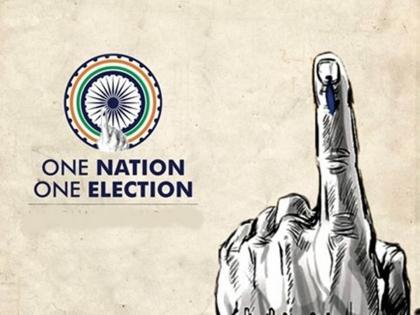One Nation, One Election: Report Reveals 32 Political Parties Supported, 15 Opposed
By Lokmat English Desk | Published: March 14, 2024 02:58 PM2024-03-14T14:58:10+5:302024-03-14T14:58:36+5:30
A recent report submitted to President Droupadi Murmu reveals that the high-level committee on 'one nation, one election' reached ...

One Nation, One Election: Report Reveals 32 Political Parties Supported, 15 Opposed
A recent report submitted to President Droupadi Murmu reveals that the high-level committee on 'one nation, one election' reached out to 62 parties for their input. Out of these, 47 parties participated in the survey, with 32 expressing support for simultaneous elections and 15 opposing the idea. Notably, 15 parties refrained from providing a response to the committee's inquiry.
According to the report, among the national parties, the Congress, the Aam Aadmi Party, Bahujan Samaj Party, and the Communist Party of India (Marxist) stood against the proposal of 'one nation, one election'. Conversely, the Bharatiya Janata Party (BJP) and National People's Party voiced their support for it.
Of the 47 political parties that responded, excluding 15, the remaining 32 not only endorsed the concept of simultaneous elections but also advocated its implementation for reasons such as conserving scarce resources, fostering social harmony, and bolstering economic growth.
Those who opposed simultaneous elections raised apprehensions that its adoption could violate the basic structure of the Constitution, be anti-democratic and anti-federal, marginalise regional parties, encourage the dominance of national parties, and result in a presidential form of government, it said.
As per the report, the Aam Aadmi Party (AAP), Congress, and CPI(M) dismissed the proposal, arguing that it undermines democracy and the fundamental structure of the Constitution. Meanwhile, the BSP, while not explicitly opposing it, raised concerns about the vast territorial extent and population of the country, which could pose challenges during implementation, the report indicated.
The Samajwadi Party emphasized in its submission that the implementation of simultaneous elections would disadvantage state-level parties, as they would struggle to compete with national parties in electoral strategy and expenditure. This, they argued, could exacerbate discord between the two categories of parties.
Additionally, among state parties, the AIUDF, Trinamool Congress, AIMIM, CPI, DMK, Naga People's Front, and Samajwadi Party all voiced their opposition to the proposal of holding simultaneous elections. The AIADMK, All Jharkhand Students Union, Apna Dal (Soney Lal), ASOM Gana Parishad, Biju Janata Dal, Lok Janshakti Party (R), Mizo National Front, Nationalist Democratic Progressive Party, Shiv Sena, Janata Dal (United), Sikkim Krantikari Morcha, Shiromani Akali Dal, and United People's Party Liberal supported the proposal.